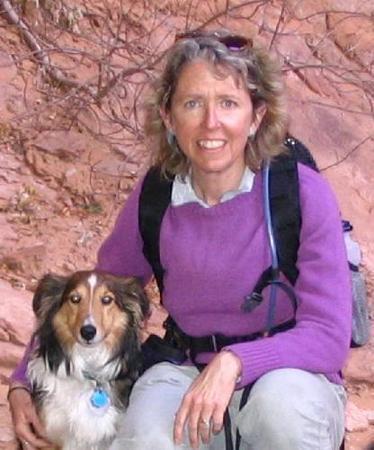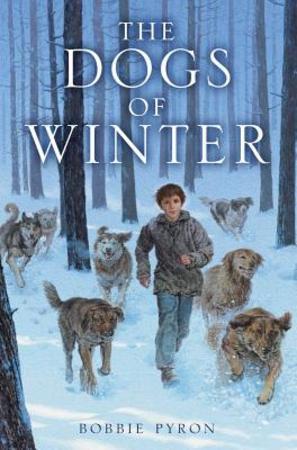 Bobbie Pyron is the author of “The Dogs of Winter.” The following is a complete transcript of her interview with Cracking the Cover.
Bobbie Pyron is the author of “The Dogs of Winter.” The following is a complete transcript of her interview with Cracking the Cover.
Have you always wanted to be a writer? Why?
Well, not always…first I wanted to be a mermaid, then a frog, and then a cowgirl. But once I became a passionate reader (at about age nine), I couldn’t imagine anything more wonderful than creating a whole world on paper and then share it with others. I had no desire to see myself on stage or screen—I wanted to see my book and my name on a library shelf.
Why do you write for young people?
I’m much more interested in exploring through writing what kids and teens are dealing with, what is happening in their lives than adults. Kids and teens are dealing with questions of identity—who am I separate from my family, from my friends? Kids and teens are trying to discover who they are and what their place is in the world. They are honest with their passions, their fears, their dreams. I want the freedom to write with that kind of honesty.
Where do your ideas come from?
My ideas come from so many things around me—family experiences, things I read, conversations overheard, things I observe. My idea for A DOGS’S WAY HOME came from observing my two dogs, Teddy and Boo, while we were out hiking. THE RING came from watching the struggles my teenage stepdaughter was going through. It’s all grist for the mill!
Specifically, where did your idea for “Dogs of Winter” come from?
THE DOGS OF WINTER is based on a true story, a real person, I read about back in 2005. It was an article on feral children—children raised by animals—and it opened with the story of Ivan Mishukov. Ivan was just one of tens of thousands of homeless children trying to survive on the streets of Moscow after the fall of the Soviet Union in the mid 1990s. Ivan was four when he ended up on the streets, which was not all that unusual. What was unusual was that Ivan survived the devastating cold, hunger, drugs, and violence of the streets by living with a pack of feral street dogs. They not only helped each other find food and keep warm and safe, they became a real family. Ivan lived with the dogs for two years before he was finally captured and taken to an orphanage. I knew I had to write his story.
“Dogs of Winter” is set in Moscow. Why? Have you ever been there?
I’ve never been to Moscow or to Russia for that matter. At first, that made me very nervous when thinking about writing a fictionalized account of Ivan’s two years with the dogs. But then I realized that a small child narrating the story would not be like a tour guide. A child will only describe the things that would matter to a child. Of course, I did a ton of research before I wrote a single word. But I tried not to obsess over things like street names and maps of the city.
The relationship between boys and dogs has played out in a number of books. What is so special about that relationship?
I don’t know that there’s something “so special” about the relationship between boys and dogs, but I do think there is something quite magical and powerful about the relationship between children and dogs. I think in many ways children feel fairly powerless and small, and like no one really listens to them or respects them because they’re “just a kid.” Dogs love you and want to be with you more than anything in the world. Dogs are great listeners, so very sympathetic. Yet, they’re up for any adventure you can think of! In many ways, dogs are the perfect sidekick to most any child, boy or girl.
 What makes “Dogs of Winter” stand out from those books?
What makes “Dogs of Winter” stand out from those books?
Well certainly, the fact that it’s based on a true story sets it apart from most of the pack. But I think also, my book doesn’t just explore that particular relationship between a boy and these dogs; it also explores the question what makes us human? And how do you define “family?”
What is it about your writing that appeals to young readers?
Gosh, I haven’t really thought about it too much, I’m just so happy that it does! I hope it’s because my books are emotionally honest and respectful of the reader. Sometimes adults who don’t know better will say to me, “Why do you do so much research for a fiction book for kids? They’re just kids!” But I feel a real obligation to tell the truth to my readers, even though it is fiction. At the end of the day, I want to write books that readers will hug to their hearts when they’ve finished the last page and say, “Oh, I loved that book…”
Looking back, how has your writing evolved?
That’s a good question! I hope my writing has become more confident, the characters more multi-layered and interesting, and the themes more complex and resonant. That would be my great, good hope.
What are you working on now?
I’m revising a middle grade novel about a notoriously unlucky boy who gets struck by lightning (out of the clear blue sky) on his eleventh birthday and suddenly finds he’s very lucky.
You’re a librarian. What books do you recommend for young readers?
I recommend to young readers books that I held to my heart after I finished the last page and said, “I loved that story.” Some of those books would be BECAUSE OF WINN-DIXIE, by Kate DiCamillo, MISSING MAY, by Cynthia Rylant, RUBY HOLLER, by Sharon Creech, WONDER, by R.J. Palacio, GLORY BE, by Augusta Scattergood, and many, many others.
Is there a book from your childhood that still resonates with you?
As I said, I was a passionate reader as a child and read tons of books. Certainly, the great classic dog stories like LASSIE COME-HOME and THE INCREDIBLE JOURNEY had a great impact not only on me as a child, but on me as a writer. I like to say my book, A DOG’S WAY HOME, is my personal love letter to those great classic books. But if I had to chose one single book from my childhood that still haunts me, that would have to be A SEASON OF PONIES, a lesser known book by Zilpha K. Snyder. It was the first book I remember reading that really dealt with how a child feels when she loses a parent. Like the best fiction should do, A SEASON OF PONIES helped me explore my own feelings of loss and not feel so alone. If my books helps just one child feel less alone, I’ll be a happy camper.
